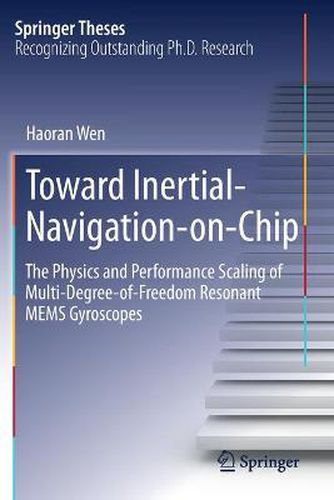Readings Newsletter
Become a Readings Member to make your shopping experience even easier.
Sign in or sign up for free!
You’re not far away from qualifying for FREE standard shipping within Australia
You’ve qualified for FREE standard shipping within Australia
The cart is loading…






This title is printed to order. This book may have been self-published. If so, we cannot guarantee the quality of the content. In the main most books will have gone through the editing process however some may not. We therefore suggest that you be aware of this before ordering this book. If in doubt check either the author or publisher’s details as we are unable to accept any returns unless they are faulty. Please contact us if you have any questions.
This thesis develops next-generation multi-degree-of-freedom gyroscopes and inertial measurement units (IMU) using micro-electromechanical-systems (MEMS) technology. It covers both a comprehensive study of the physics of resonator gyroscopes and novel micro/nano-fabrication solutions to key performance limits in MEMS resonator gyroscopes. Firstly, theoretical and experimental studies of physical phenomena including mode localization, nonlinear behavior, and energy dissipation provide new insights into challenges like quadrature errors and flicker noise in resonator gyroscope systems. Secondly, advanced designs and micro/nano-fabrication methods developed in this work demonstrate valuable applications to a wide range of MEMS/NEMS devices. In particular, the HARPSS+ process platform established in this thesis features a novel slanted nano-gap transducer, which enabled the first wafer-level-packaged single-chip IMU prototype with co-fabricated high-frequency resonant triaxial gyroscopes and high-bandwidth triaxial micro-gravity accelerometers. This prototype demonstrates performance amongst the highest to date, with unmatched robustness and potential for flexible substrate integration and ultra-low-power operation. This thesis shows a path toward future low-power IMU-based applications including wearable inertial sensors, health informatics, and personal inertial navigation.
$9.00 standard shipping within Australia
FREE standard shipping within Australia for orders over $100.00
Express & International shipping calculated at checkout
This title is printed to order. This book may have been self-published. If so, we cannot guarantee the quality of the content. In the main most books will have gone through the editing process however some may not. We therefore suggest that you be aware of this before ordering this book. If in doubt check either the author or publisher’s details as we are unable to accept any returns unless they are faulty. Please contact us if you have any questions.
This thesis develops next-generation multi-degree-of-freedom gyroscopes and inertial measurement units (IMU) using micro-electromechanical-systems (MEMS) technology. It covers both a comprehensive study of the physics of resonator gyroscopes and novel micro/nano-fabrication solutions to key performance limits in MEMS resonator gyroscopes. Firstly, theoretical and experimental studies of physical phenomena including mode localization, nonlinear behavior, and energy dissipation provide new insights into challenges like quadrature errors and flicker noise in resonator gyroscope systems. Secondly, advanced designs and micro/nano-fabrication methods developed in this work demonstrate valuable applications to a wide range of MEMS/NEMS devices. In particular, the HARPSS+ process platform established in this thesis features a novel slanted nano-gap transducer, which enabled the first wafer-level-packaged single-chip IMU prototype with co-fabricated high-frequency resonant triaxial gyroscopes and high-bandwidth triaxial micro-gravity accelerometers. This prototype demonstrates performance amongst the highest to date, with unmatched robustness and potential for flexible substrate integration and ultra-low-power operation. This thesis shows a path toward future low-power IMU-based applications including wearable inertial sensors, health informatics, and personal inertial navigation.